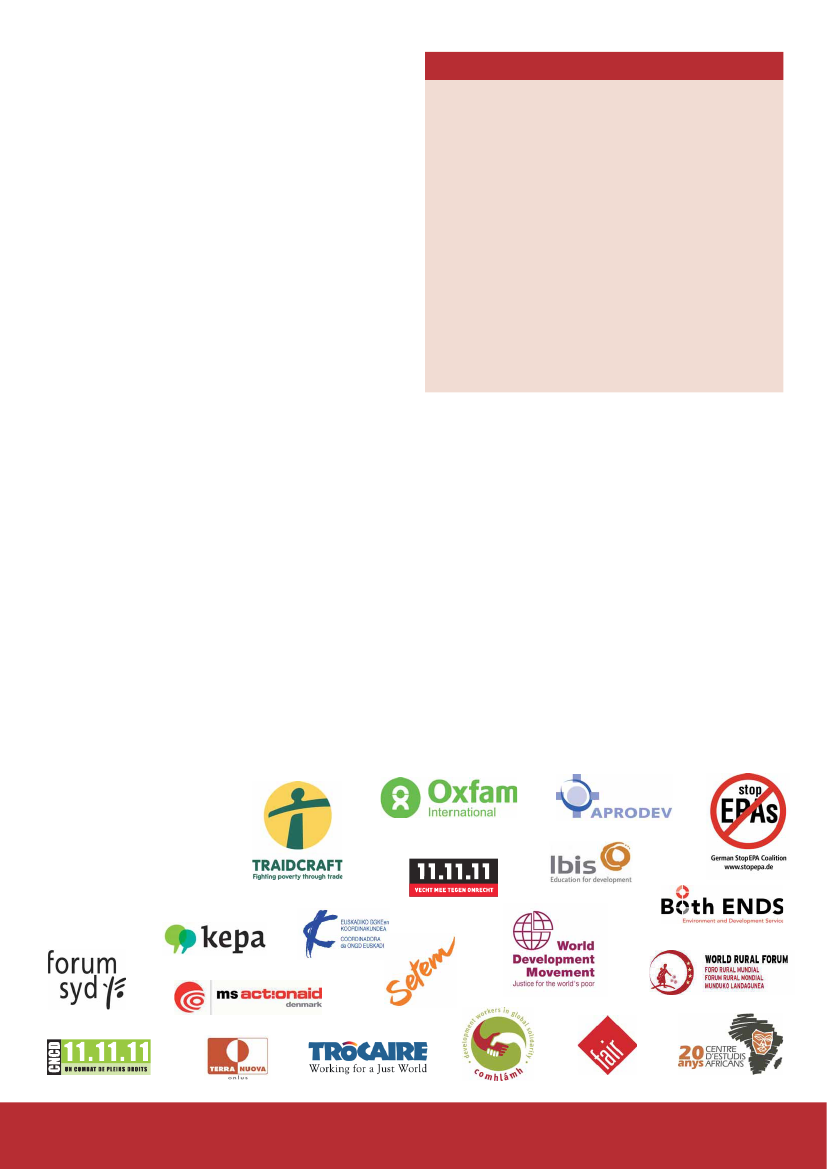Europaudvalget 2008-09
EUU Alm.del Bilag 555
Offentligt
Economic PartnershipAgreementsEconomic Partnership Agreements (EPAs) are freetrade deals being negotiated between the EuropeanUnion (EU) and 76 developing countries – mostlyformer colonies in Africa, the Caribbean and thePacific (the ACP). The agreements set the rulesof trade between Europe and these countries fordecades to come, affecting the lives of millions ofpeople. Ostensibly intended to be ‘developmentagreements’ that would promote regional integration,there is huge controversy about whether EPAs willdeliver or undermine these objectives.
WhatEPs needMto know
Furthermore, the EU insists that the opening up of ACPmarkets should not be confined to trade in goods only– which would suffice to satisfy WTO requirements – but that‘full’ EPAs should also include the liberalisation of services,investment and government procurement, the introductionof competition rules and the reinforcement of intellectualproperty rights protection.
Why the concern about EPAs?Loss of manufacturing and jobsBecause the EU has demandedthat EPAs involve the elimination of tariffs on at least 80% oftrade, ACP countries have very little scope to support existingor future manufacturing industries. Through seeking to defendtheir agriculture from subsidised imports, countries are leftwith almost no flexibility to support the value-addition that issuch an essential part of moving up the development ladder.
The European Parliament’s roleIn addition to leading to far-reaching economic liberalisation,EPAs will also create new institutions – the main being jointEU-ACP Ministerial Councils with important competencesregarding the implementation of each agreement. Therefore,the European Parliament will be called upon to give assent tothe various EPAs (under EC Article 300) once both parties havesigned the agreements. This process began in March 2009, withthe European Parliament voting for the ‘interim EPA’ with Côted’Ivoire and the ‘full EPA’ with the Caribbean region.• The Parliament is likely to be called upon to give its assentto further EPAs during the latter half of 2009 and 2010.• Prior to voting on EPAs, the Parliament has a critical roleto play in ensuring that the Commission is not exertingpressure upon ACP countries to sign up to deals that fallshort of their stated development objectives.
‘EPA does not give sufficient opportunitiesfor businesses in LDCs to develop to levelswhere they can compete favourably with theircounterparts in the EU and that is critical to thedevelopment of a country like Ghana.’Nobel Prize winner, economist Joseph Stiglitz, Accra, 8 July 2008
What are EPAs and why arethey being negotiated?For several decades ACP countries have had preferential accessinto the EU market, but this arrangement required periodicalauthorisation (a ‘waiver’) from the WTO membership, asACP preferences were found to discriminate against otherdeveloping countries. EPAs were proposed by the EuropeanCommission as a way out of this problem – and it was agreedin 2000, under the ‘Cotonou Agreement’, that these dealswould be negotiated and concluded by the end of 2007. Asa type of Free Trade Agreement, the EPAs were designed topreserve ACP preferences – but required these countries toopen their markets to European goods in return.The ACP countries understood that EPAs would comewith a strong development package attached, to buildthe competitiveness of their industries and diversify theireconomies. The European Union, however, asserts that thedevelopment dimension of the EPAs lies in the far-reachingeconomic and trade liberalisation that they should bring.
Agriculture and food security under threatWhile most ACPcountries have excluded many agricultural products fromliberalisation, the devil is in the detail. ‘Standstill’ clauses (thatfreeze tariffs at current levels) and inadequate ‘safeguards’could still make it difficult for ACP countries to defend theiragricultural sectors from subsidised EU imports, which could inturn undermine food security and livelihoods. As highlightedby the UN Special Rapporteur on the Right to Food, this isparticularly worrying given that the EU recently re-introducedexport subsidies in agriculture.
‘The Special Rapporteur … would like to drawthe urgent attention of all States … to theimplications [EPAs] may have on the right tofood of poor farmers in the developing world.He is particularly concerned about the potentialnegative impact of greater trade liberalization onpeasant farmers in the ACP countries, especiallygiven unfair competition with highly subsidizedEU production.’UN reportRight to Food,22 August 2007
Fiscal revenue lossFar-reaching elimination of tariffs willplace a serious hole in ACP countries’ budgets, as many ACPstates rely upon trade taxes for up to 40% of their governmentrevenue. For example, by 2012 Côte d’Ivoire is likely to lose anestimated $83 million, equivalent to its current health spendingfor half a million people, as a result of liberalising tariffs underEPAs. This is in a context where the economic downturn isalready placing great strain on government budgets.Undermining regional integrationEPAs were intended to beregional agreements, which would support the integrationof small and fragmented ACP markets into stronger regionaleconomies. Yet studies predict that granting free market accessfor the EU would undermine the scope for the ACP to firstbuild up their own regional production chains. Furthermore,in the rush to conclude agreements at the end of 2007, anumber of countries were forced to sign individual agreements– creating different trade regimes with the EU to those of theirneighbours and setting back regional integration.
2009 monitoring report demonstrates that EU commitments forAid for Trade for Africa – and for the ACP – have been fallingsince 2005.1Services, Intellectual Property Rights (IPR) and so-called‘Singapore Issues’ (investment, government procurement,competition policy and trade facilitation)In addition to far-reaching liberalisation of trade in goods, the EU wants ACPcountries to make a series of commitments enabling Europeaninvestors to operate more easily in their markets. However,rules on intellectual property could undermine access tomedicines and technology in these countries. In addition,services liberalisation and inclusion of Singapore Issuescould restrict the governments’ scope to regulate investorsin the public interest or to give domestic small and mediumenterprises a boost – just as European governments aresupporting their SMEs in times of global economic downturn.Negotiation processThere has been much concern expressedabout the actual process of the negotiation of theseagreements. ACP leaders and negotiators have indicated thatat various stages they have felt under severe pressure to signup to agreements that did not reflect their concerns. Moreover,the negotiating process has not taken account of asymmetriesof negotiating capacity, and studies show that different ACPcountries received deals that reflect their negotiating capacity,rather than taking account of their level of development.
‘We join the call for the nullification of theinterim EPAs and for appropriate time to begiven for negotiating new trade relationsbetween Africa and Europe that take accountof Africa’s genuine needs for development andregional integration.’International Trade Union Confederation – Africa (ITUC-Africa)secretary general Kwasi Adu-Amankwah, 1 May 2008
Inadequate aidThe ACP have always stressed that they willneed significant additional resources to cover the immediateadjustment costs from EPAs, such as declining revenues and joblosses, and to build their production systems and competitivenessin order to benefit from access to EU markets. In fact, the EC’s
‘If these countries (in Europe) can’t handle opentrade and they have a social safety net for theirpeople and a large per capita GDP, what willreciprocity in the EPA do to us?’Guyanan President Bharrat Jagdeo, 25 February 2009
State of play – agreements initialled and signed (August 2009)•A full EPAbetween the EU and the 15 Caribbeancountries, signed2by both parties and approved by theEuropean Parliament.•Interim EPAs signedwithCôte d’Ivoire(individual I-EPAwithout regional partners);Cameroon(individual I-EPAwithout regional partners);Botswana, Lesotho, Swazilandand Mozambique(four out of seven of the SouthernAfrican SADC region’s EPA countries); andPapua NewGuinea(individual I-EPA without other Pacific regionalpartners). TheCôte d’IvoireI-EPA has also been approvedby the European Parliament.•Interim EPAs initialled, but not yet signed or ratifiedwithGhana(individual I-EPA without regional partners); thefive East African Community countries –Kenya, Tanzania,Uganda, Rwanda, Burundi(a regional agreement);Fiji(individual I-EPA without other Pacific regional partners);Comoros, Madagascar, Mauritius, Seychelles, Zambia andZimbabwe(common I-EPA agreement, but individualmarket access schedules without regional partners fromthe East and Southern African region); andNamibia(partof the Southern African SADC region).•No EPA: 40 countries– most of the 76 ACP states involved inthe negotiations have not initialled any form of EPA.
DEFINITIONS:Interim EPAsare mostly confined to trade in
goods – which is all that is necessary for WTO compatibility(in WTO terms these I-EPAs are already ‘full’). So-calledfull EPAs(as defined by the EC) would tie the parties intofurther commitments on services and Singapore Issues, aswell as the enforcement of intellectual property rights.
EPAs: what MEPs need to know
What happened as the 2007deadline approached?As the end-2007 deadline for concluding the deals drew near,agreements were far from concluded – and many countriescalled for more time. However, the EC was unwilling to grantthis request. Instead they suggested that countries not ableor willing to conclude ‘full EPAs’ could enter into ‘interim’agreements (I-EPAs), mostly confined to trade in goods,in order to preserve their access to the EU market – whilethey continued to negotiate towards more comprehensiveagreements. ACP developing countries unwilling to enter intoI-EPAs by the deadline were told by the EC that they would befaced with punitive tariffs on their exports into the EU.
European Parliament resolutionsOn 25 March 2009, the previous Parliament adoptedeight Resolutions concerning the full Caribbean EPAand the seven different interim EPAs. These Resolutionscontained important demands upon the Commission, thefulfilment of which the new Parliament could scrutinise.The Resolutions called for:•the Commission to adopt a flexible approachand to respond favourably to ACP requests forre-negotiationThe European Parliament recognisedthat‘these agreements include a number ofcontentious provisions’,3calls on‘the Commissionto offer maximum flexibility in the continuednegotiations, as referred to in the conclusions on thisissue by the GAERC of May 2008 and November 2008’,4‘the Commission to respond unconditionally and in aflexible way to demands by ACP countries to reviewcontentious issues in the IEPAs’,5and for there to beprovision for‘countries to renegotiate any provisionson contentious issues that they wish to amend or havewithdrawn.’6•there to be no pressure on ACP countries to take onfurther commitments in full EPAsThe Parliamentrecognised that‘WTO rules do not require EPAcountries to undertake liberalisation in the areasof services, investment, government procurement,intellectual property rights, competition [...]Negotiations on these issues should take placeonly when both parties are willing to do so,’7andtherefore‘urges the Commission not to put unduepressure on the SADC countries to accept liberalisationcommitments and regulatory obligations regardingservices and the so-called “Singapore issues”.’8•alternatives to be provided for countries not in aposition to enter into an EPAThe Parliament calledon the Commission‘to provide alternatives thatguarantee market access for those countries notwishing to commit to the full EPA,’9in line with therequirements of the Cotonou Agreement.
‘We feel that it is deeply unjust for the EU tooblige the world’s poorest countries to choosebetween liberalising their domestic marketsunder pressure – with the risks that this mayentail to national and regional economies – orrisking livelihoods in export sectors as tariffs areraised on exports to the EU.’Pierre Magne, President, African Industrial Association,17 October 2007
In this context, during the last weeks of 2007 many countriesquickly initialled the texts that were placed before them.This flurry of initiallings was very soon followed by a strongstatement from ACP Ministers‘observ[ing] that EuropeanUnion’s mercantilist interests have taken precedence over theACP’s developmental and regional integration interests’ andcalling for ‘the contentious clauses therein’tobe ‘opened upfor re-negotiation.’(Brussels 13 Dec 2007 ACP/25/013/07) In2009, ACP countries are still calling for these contentious issuesto be re-negotiated – and many do not want to proceed to ‘fullEPAs’.In May 2008, the European Union’s General Affairs andExternal Relations Council reflected these concerns in theirEPA conclusions:‘acknowledging concerns expressed by ACPpartners and the existence of, in some cases, problematic issuesstill outstanding in the negotiation, the Council underlines theneed for a flexible approach while ensuring adequate progress,and calls on the Commission to use all WTO-compatibleflexibility and asymmetry, in order to take account of differentneeds and levels of development of the ACP countries andregions.’In eight European Parliament Resolutions adoptedin March 2009, MEPs also called for the Commission to showgreater flexibility (see box).
How flexible is the Commission?During the course of negotiations, the European Commission’sDG Trade earned a reputation for strong-arm negotiatingtactics and a dismissive approach to ACP proposals – arecord that has been well documented.10However, TradeCommissioner Ashton promised a change of approach. Since
her appointment in October 2008, Commissioner Ashton hasconsistently reassured the ACP, the European Parliament andother stakeholders that she is adopting a flexible approach. Tothe European Parliament in Strasburg on 24 March 2009 shefor instance stressed that‘each EPA must be flexible in contentand pace’and that‘Singapore Issues are only negotiated ifwanted and welcomed.’Yet the realities of the negotiations do not bear this out. TheCommission:• continues to insist on a tariff elimination of 80% in fifteenyears – even if no WTO rule requires this – consistentlyrejecting less far-reaching offers from West and Central Africa
EPAs: what MEPs need to know
• refuses to revise any I-EPA, and instead pressurises countriesto sign even when they maintain reservations about theprovisions that these agreements contain• considers the entering into ‘full EPAs’ – not required forWTO compatibility – to be the only context in which theywill ‘consider’ revising a limited number of contentiousissues that they expect the ACP to have already signed up toin the I-EPAs• continues to put pressure on ACP countries to includefurther commitments within the EPAs that are not requiredby the WTO, nor by the Cotonou Agreement.Indeed, as was pointed out by DG Trade Director PeterThompson on 30 June 2009,‘[Catherine Ashton] has thesame mandate, but a different tone and pair of ears. She haschanged the atmosphere; but there is no change in substance;we are still working on the same rules and guidelines.’
Our demandsThe organisations represented in this briefing are callingupon the European Commission and the EU member stategovernments to:• demonstrate full flexibility and support ACP requests forrenegotiation of contentious issues in I-EPAs – revisionsof I-EPAs should not be conditional upon the agreement ofso-called ‘full’ EPAs• fully respect ACP positions on services, intellectual propertyand Singapore Issues – and refrain from pressuring countriesinto agreement in these areas, either explicitly or throughdemanding them as a quid pro quo for the revision ofcontentious issues• fully support any requests from ACP countries for alternativesolutions – as mandated in the Cotonou Agreement (Article37.6) – in cases where they judge that the Commission’sterms for EPAs are not facilitative of their development.
Request to MEPsWe urge you to:
••actively monitor developments in the ongoingsupport the demands opposite
EPA negotiations to ensure that the Commission isliving up to its promise of flexibilityinviting contributions from ACP governmentrepresentatives, civil society and parliamentariansparliamentarians and civil society in thesecountries
1 According to the European Commission’s Aid for Trade monitoringreport 2009 (COM 2009/160 final, p30), EU AfT commitments to the ACPhave fallen from 2,975 million euros in 2005 to 2,097 million euros in2007. The share of AfT for the ACP in the overall EU AfT has fallen from50% to 36% over the same period.2 Haiti – the only Least Developed Country in the region – has initialledbut not signed the full EPA.3 See for example: SADC report, Recital E; EAC report, Recital J.4 See for example: Pacific report, Article 24.5 Cameroon report, Article 36.6 SADC report, Article 20; ESA report, Article 8; Côte d’Ivoire report,Article 5; Pacific report, Article 25; EAC, Article 36.7 Ghana report, Recital C, with similar clauses in EAC report, Recital B andArticle 9.8 SADC report, Article 24 – with equivalent clauses in other reports, egGhana report, Article 9; Pacific report, Article 10.9 Côte d’Ivoire report, Article 27 and similar clause in Cameroon report,Article 37 and Ghana report, Recital H.10 See for example:Partnership Under Pressure: an Assessment of the EC’sconduct in the EPA negotiations(2007), ActionAid, Cafod, Christian Aid,Tearfund and Traidcraft.
•organise hearings in the European Parliament,•travel to ACP countries and speak with
•withhold assent for (interim) EPAs until ACP
reservations and concerns are adequatelyaddressed and there is clarity about the finaloutcome of negotiations.
� Traidcraft August 2009This report was produced by Traidcrafton behalf of the following organisations.For further information contact:Sophie Powell, TraidcraftTel: 0207 400 4153Email: [email protected]
EPAs: what MEPs need to know




